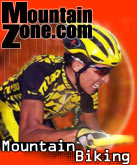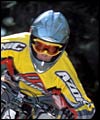
Blazing Trails on the Bike Scene
November 2002 — Chamonix, France
 Fionn Griffiths |
||
Yeah - but I enjoy it (laughs.)
MZ: A lot of people think it's an easy job, riding a mountain bike for a living, but what's the reality of competing at such a high level?
It seems like an easy job because it's fun. Personally I can't say that working at McDonalds or Toys 'R' Us would be that much fun, so from that aspect, it's easy because you enjoy it. But there's a lot of background work that people don't realize, such as training and chasing sponsors or contracts. It's pretty demanding.
It's also hard not being home, not seeing your family and friends, but it's also good because I get to travel and see the world which I'd like to be doing even if I wasn't racing. The downside of traveling is that you don't really get to see much of the countries that you're in. You turn up, race, and then you're on the next flight out to another venue.
"My back wheel hooked up just as I got to the top and I just took a dive, arms by the side, straight into the berm...." |
I ride my bike because I love to. Even if I wasn't sponsored, I'd still be riding my bike...it's just the way it goes. You can't ask for a better lifestyle than to be out in the mountains riding - a cross-country bike or even a road bike - it's so good.
MZ: Have you suffered any injuries?
Leysin, Switzerland, was my worst crash. I went over the bars on something that was about 15 to 20 feet high. It wasn't vertical but a roll-in that dropped right into a berm. My back wheel hooked up just as I got to the top and I just took a dive, arms by the side, straight into the berm. I dislodged a vertebrate in the bottom of my back and fractured my neck. I was dizzy when I got up and it took me about a half-hour to get back on my bike, but I got on it and rode the rest of the course (laughs.)
MZ: You rode the rest of the course like that?
Yep.
MZ: When did you realize you'd injured your back?
I didn't know for two months. I'd been complaining of neck and back pain to my parents and friends so I got some X-rays and they said, 'Your back is in two pieces.'
As far as the injury goes, it's good that it's so low. So now I've got two options, I can just leave it - it's never going to reattach itself, or I can have a spinal fusion, but that would mean I probably wouldn't be able to ride my bike and if I could, it wouldn't be competitively.
MZ: After you're done riding, what would you like to do?
I'd like to stay in the sport but that really depends on the industry itself. I'd like to be a team manager or something along those lines, but if the industry can't sustain that, then something along the lines of an outdoor pursuits instructor - rock climbing, abseiling, canoeing, map work. I studied that in college and I really enjoyed it.
— Lucas Kane, MountainZone.com Correspondent
Lucas Kane, a freelance photo journalist, wandered the world for nearly a year
in search of the perfect terrain, but it wasn't until he arrived in Chamonix, France, that he found a new appreciation for the word "steep" and the utmost respect for Mother Nature.
